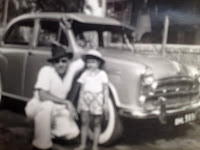
The house was set back amid trees. I remember large rooms, high thresholds, windows overlooking a quiet street, a little shop selling essentials. A high wide bed, my parents lifting me onto and off. My father and I calling to the shopkeeper whose helper would run across to make immediate deliveries. My father handing me coins to place on the boy’s outstretched palm.
We went often to shops, parks, the zoo. Early one morning, we went farther to a busy place with heaps of bright flowers. My father held me high above the crowd, amid deafening drumbeats and ringing of bells, we saw a goat sacrificed. I sensed consternation on my mother’s face as she turned me away. Years later, she told me that it had been a trip to Kali Bari.
We strolled outside late to look at glittering idols festooned with flowers as people sang and beat on drums. My mother often looked exhausted and my father called me to him whenever I clambered onto her lap. I was often miserable, realizing that we were far from home, in new surroundings. Missing my grandparents, I cried my heart out because so much was unfamiliar.
Neighbours stopped by to greet us but they often used words I did not understand. Once, many visitors came. In a photograph, my parents and I, dressed in a lacy frock, gazed at two flaming candles on a cake. I remembered my stomach hurting, miserable, wanting to lie down on my mother’s lap.
Then, a jumble of memories. My mother, looking pale, driven away in a car with my father while someone whom I mistook for my grandmother, tried to console me. Then, a blank … until we were back home in Bombay. My mother weak, recouping after her medical crisis, my father frequently on tour. But my grandparents were there and I was happy. I did not remember our return journey. But the name of the street we lived on lingered in words I had learned to speak.
Kolkata, late-seventies.
I arrived just before the Pujas, the “aubangali bou” from New Delhi. Fresh-faced, eager to imbibe the cultural ethos but still stumbling linguistically in spite of having prepped with Bornoporichoy, I looked to my husband and in-laws to guide me into the rhythms of life in the legendary city that I had read and heard much about.
The monsoons withdrew, the air cleared. People spilled onto streets, makeshift stalls mushroomed along sidewalks that became increasingly inaccessible. At home too, on a quiet street near the city’s famous lakes, the spirit of the Pujas pervaded. Between the culinary efforts of the aging family cook and a local catering service, trays of traditional sweets and savories would materialize along with everyday treats from the corner mishtirdukaan.
Music emanated from neighboring pandals, adhunik and filmi renderings merging with the subtler semi-classical and classical. Bright lights from the pandals illuminated our whole street. It was like living inside a grand spectacular carnival. On Mahalaya, the day of the Goddess’s fabled “arrival”, a great calm descended. People were still rushing but seemed poised and serene. We visited pandals to admire bejeweled protimas of Ma Durga. Again and again I was struck by the tranquility in the delicately sculpted face.
Decades later, on the other side of the world, looking down at me with the same expression of dignified repose from our living room wall is a terracotta face of Ma Durga that my husband brought back all the way from Bishnupur in Bankura district near Kolkata.
Many writers have explored the intersections of individual existence, place and history. In “Life History and The Historical Moment’, psychoanalyst Erik H. Erikson wrote that we often engage in “circular chronology”, where certain memories recast the present in a new light and suggest “new forays into the more distant past."
Daily life is filled with random moments yet we constantly seek out meaningful patterns and coherence, as psychologist Aaron Antonovsky pointed out. Even so, this may not happen unless and until memories from different phases of one’s life spontaneously fuse together in an unexpected moment of epiphany.
I recall discovering that our house was just around the corner from where my parents and I lived briefly when I was two. The street name was imprinted in my memory, the grapevine was active and one day, everything fell into place. We had a visitor - the lady who lived in the house remembered us and invited me over. But somehow the house seemed different, not at all as I remembered it. Until I glimpsed through the windows that little shop - well, the not-so-little shop that I now patronized as a young homemaker on the not-so-quiet-anymore street - and realized this had been a homecoming after all.


Comments
Post a Comment